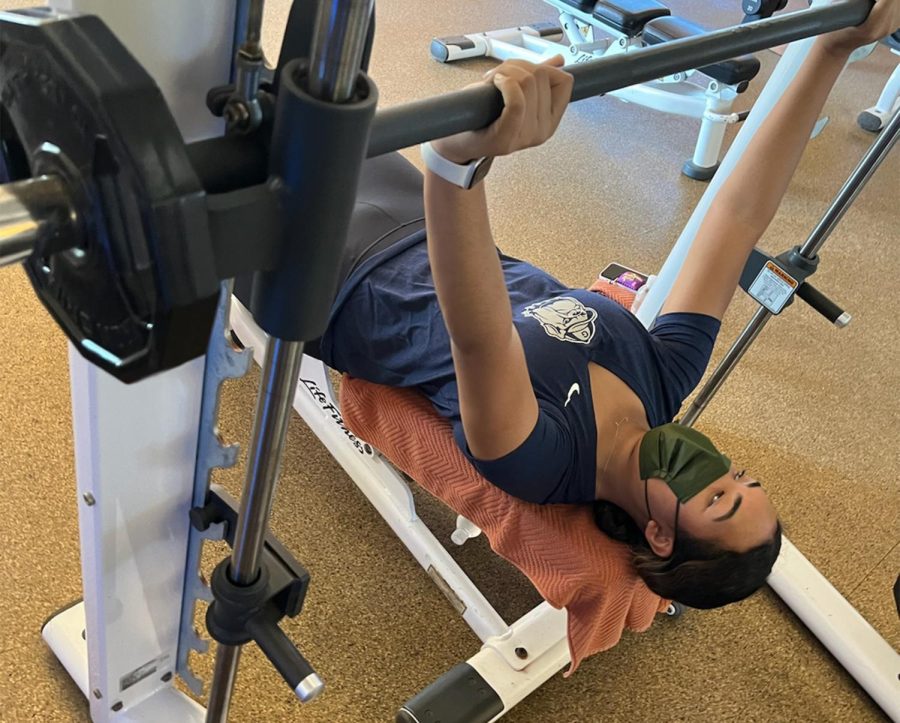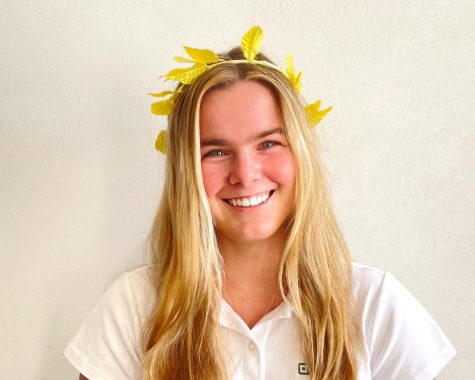To rest or not to rest: How Archer athletes spend their off season
Photo credit: Reno Anoa’i
Vaughan Anoa’i (’22) bench presses in the gym. Besides her club or school volleyball practices, she trains on her own. Even in the off season she makes time to weightlift and practice. “I definitely was grateful for the high school season which kept me in shape as we transitioned back and forth,” Anoa’i said. “I definitely view the two of them as interchangeable in the sense that they rely on one another.”
March 1, 2022
While most athletes are highlighted for their athletic endeavors and accomplishments during their sports season, the off-season serves as a time to recharge, improve and train in preparation for the next season. With a variety of options of how to spend the off-season, how do Archer athletes utilize their time off?
Senior Naya Ben-Meir played for the varsity tennis team in the fall. While most of her season was spent with Archer’s team, she spent her off-season playing with her other coach as well as non-Archer players. Ben-Meir said continuing to play tennis in the off-season benefits her in-season play.
“It definitely helps me. There was one year where before the season started, I played a lot over the summer because it’s a fall sport,” Ben-Meir said. “I went to a tennis summer camp, and it was a pretty high intense camp. And when I got into the season, I definitely felt more prepared and I improved … and my coaches saw it and they told me that they definitely saw a difference. I also just felt stronger when I continued to play.”
Cristina Fuentes-Alva (’22) is a varsity basketball and softball player. The off-season for basketball, a winter sport, is actually the start of the softball season in the spring. Fuentes-Alva said the continuation of play helps her to stay in shape.
“I build endurance because basketball is so fast-moving, and then I go into softball [and] I feel really fast,” Fuentes-Alva said. “And I do notice when I start softball I can do a lot of things without it being hard because it’s a fast-moving sport.”
Vaughan Anoa’i is a member of the varsity volleyball team and also plays for Sunshine Volleyball Club. For Anoa’i, her participation in the sport is year round and consists of a minimal off-season, that typically lasts only a few weeks. Spanning from late July, with the start of high school volleyball, Anoa’i continues until approximately late November right when club volleyball begins. She then ends club volleyball in July.
“A lot of times when people ask me what my offseason looks like, I’ll usually respond that there isn’t one,” Anoa’i said. “It’s a very, very long season. Usually, there isn’t one, besides like one to two weeks, but never a full off-season.”
For many athletes, COVID-19 acted like an extended off-season. Ben-Meir said the time off helped her appreciate the days that she does have the opportunity to play.
“During COVID, we didn’t have a tennis season. I found that I really needed tennis,” Ben-Meir said. “I did a tennis clinic with a bunch of other random tennis players. It was just once a week but it was a … pretty stressful time with COVID, and being able to leave my house and play the game really brings me to a different mindset because I’m forced to focus on what’s happening right now. And so, in that way, it’s like a break from my mind … and I know that whenever I go play tennis with anybody, I am thinking completely about the game and it’s so easy for me to escape into it and find my competitive side.”
During the off-season that she does have, Fuentes-Alva typically spends it training in the gym. She said she enjoys weightlifting and working out, as well as training specific skills for softball.
“I usually do weightlifting. I’ll go with my dad and my family and just do it for fun,” Fuentes-Alva said. “Obviously, it’s not as intense. But I also like practicing hitting for softball or playing catch with my dad or sisters because they all play. But it’s pretty rare because we’re all so busy, or I’ll just do weightlifting on my own during the off-season.”
Because of her short off-season, Anoa’i said she treats it less as a time to stop, but rather as an opportunity to slow down.
“When you are constantly training that many times a week, [and] when you have two weeks off, or let’s say a little less than a month, you don’t really have the time or space to fully take an off-season, just because you know that the next endeavor is going to start up again soon,” Anoa’i said. “It’s not quite enough time to take a full break or take a full vacation. For me, in the years that I’ve done it previously throughout high school, I’ve just learned that it’s better to obviously go lighter — and you don’t have to do quite as intensive training — but also recognize it’s not the best to take two weeks off because the cycle starts over again.”
Besides the actual physical activity, Fuentes-Alva said she appreciates the time management she has when playing in-season, which causes her to miss it during the off-season.
“I feel very unproductive if I don’t have a busy day,” Fuentes-Alva said. “As weird as that sounds, I just need to have a tight schedule to get more things done. And it really helps you. It doesn’t drain me going to all these practices and things. It gives me energy and I feel way more excited to get a lot of work done.”
Overall, Anoa’i said that while her off-season is short, she still appreciates the time she does have. It provides a space to remedy her mind as well as her body in preparation for the next season.
“I definitely think it makes me more appreciative of that little time even though it isn’t an entire off-season,” Anoa’i said. “I’m a firm believer that you have to heal the mind before you heal the body. So whether that’s a physical injury or if there’s a blind spot or point that I’m struggling with, I definitely will use that time to recharge my mind just because it certainly does take a toll. And I am grateful that in recent years, collegiate athletes, as well as professional athletes, have been using online forums and other platforms to really amplify the importance of mental health awareness within athletes.”









